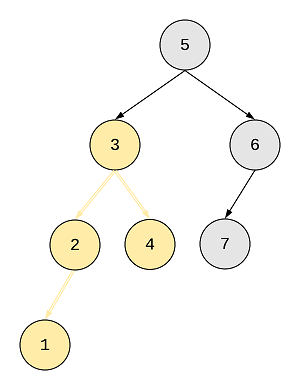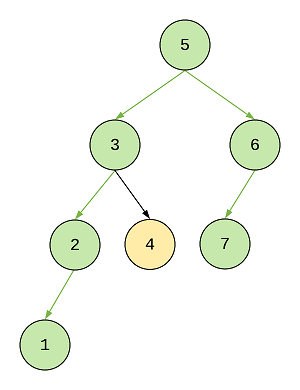Diameter of Binary Tree Solution
Leetcode Solution: Understand and solve Leetcode problem Diameter of Binary Tree(543)
In this article we’ll be solving the problem: Diameter of Binary Tree. Just like the problem, Convert BST to Greater Tree and Merge Two Binary Trees, this problem also requires a some modification in a simple Tree Traversal approach.
Given a binary tree, you need to compute the length of the diameter of the tree.
The diameter of a binary tree is the length of the longest path between any two
nodes in a tree. This path may or may not pass through the root.
Example:
Given a binary tree
1
/ \
2 3
/ \
4 5
Return 3, which is the length of the path [4,2,1,3] or [5,2,1,3].
Note: The length of path between two nodes is represented by the number of edges between them.
We’ll be using the following tree as an example input:

To solve this problem, we’ve to find the longest diameter of the tree and for that we’ve to find the length of the path between any two nodes of the tree. Also, this path may or may not pass through the root.
The longest path for the example tree is:

However, while we’re in the process of finding the diameter of the tree, we’ll find a lot of them, like, this one:

Here the length of the diameter will be 3 (1 -> 2 -> 3 -> 4) but this is not the actual diameter of the tree. However, the left path of this diameter is part of the longest diameter, so, we’ll pass the longest of the right or the left path back to the parent node.

Here is the program for that:
type TreeNode struct {
Val int
Left *TreeNode
Right *TreeNode
}
var maxDiameter int
func diameterOfBinaryTree(root *TreeNode) int {
maxDiameter = 0
postOrder(root)
return maxDiameter
}
func postOrder(node *TreeNode) int {
if node == nil {
return 0
}
leftSize := postOrder(node.Left)
rightSize := postOrder(node.Right)
// calculating the current diameter
currentDiameter := leftSize + rightSize
if currentDiameter > maxDiameter {
// updating the maximum diameter if the current diameter
// if the current diameter is greater
maxDiameter = currentDiameter
}
// then longest of the left or the right path is return
if leftSize > rightSize {
return leftSize + 1
}
return rightSize + 1
}
This program is available on GitHub as well. Here we’re using the Post Order tree traversal approach.

Related Pages:
- All Elements in Two Binary Search Trees Solution
- Construct Binary Search Tree From Preorder Traversal Solution
- Maximum Binary Tree Solution
- Sum of Nodes With Even Valued Grandparent Solution
- Deepest Leaves Sum Solution
- Symmetric Tree or Mirror Tree Solution
- Diameter of Binary Tree Solution
- Binary Tree Paths Solution
- Cousins in Binary Tree Solution
- Sum of Left Leaves Solution
- Same Tree or Equal Tree Solution
- Minimum Absolute Difference in BST Solution
- Construct String From Binary Tree Solution - Leetcode
- Two Sum IV - Input is a BST Solution - Leetcode
- Convert BST to Greater Tree Solution - Leetcode
- Convert Sorted Array to Binary Search Tree Solution
- Average of Levels in Binary Tree Solution
- Leaf Similar Trees Solution - Leetcode
- Sum of Root to Leaf Binary Numbers - Leetcode
- Univalued Binary Tree - Leetcode
- Maximum Depth of N Ary Tree - Leetcode
- Increasing Order Search Tree - Leetcode
- Merge Two Binary Trees Solution
- Range Sum of BST - Leetcode